The Samsung 750 EVO (120GB & 250GB) SSD Review: A Return To Planar NAND
by Billy Tallis on April 22, 2016 8:00 AM ESTATTO
ATTO's Disk Benchmark is a quick and easy freeware tool to measure drive performance across various transfer sizes.
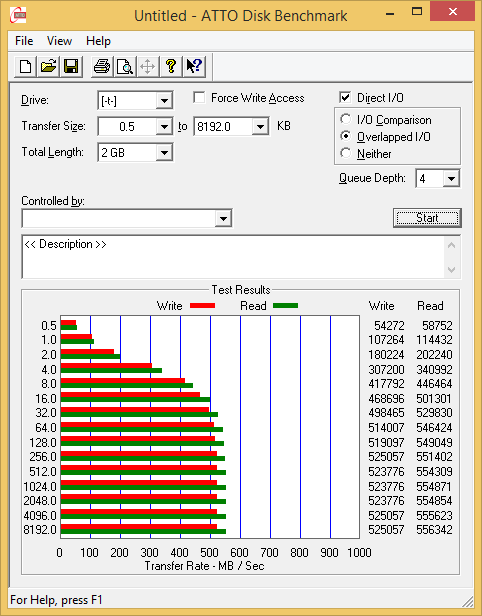 |
|||||||||
The ATTO benchmark shows the 750 EVO has good performance on small transfers and a maximum write speed that is very close to the read speed. The 120GB 750 EVO even provides better write speeds than the 850 Pro 128GB thanks to the former's SLC write caching.
AS-SSD
AS-SSD is another quick and free benchmark tool. It uses incompressible data for all of its tests, making it an easy way to keep an eye on which drives are relying on transparent data compression. The short duration of the test makes it a decent indicator of peak drive performance.
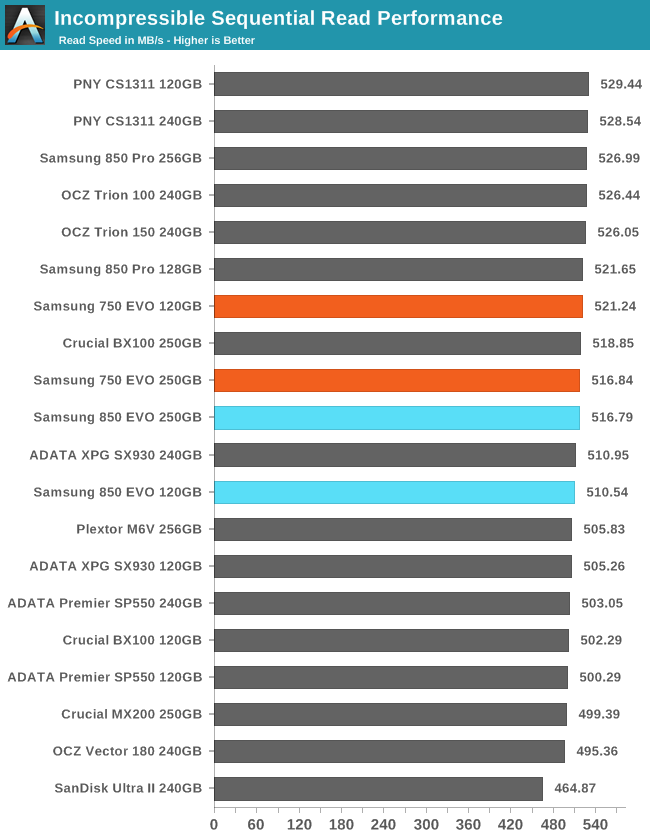
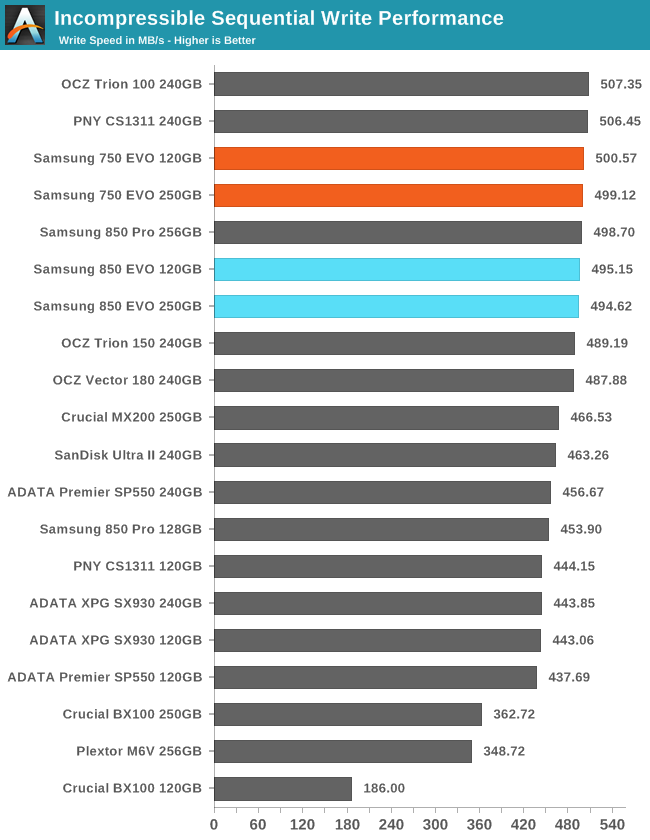
The 750 EVO provides top-notch burst speeds for reads and writes. The write speeds in particular distinguish the 750 EVO from most other TLC drives and low-end MLC drives that suffer from a lack of parallelism at small capacities.
Idle Power Consumption
Since the ATSB tests based on real-world usage cut idle times short to 25ms, their power consumption scores paint an inaccurate picture of the relative suitability of drives for mobile use. During real-world client use, a solid state drive will spend far more time idle than actively processing commands. Our testbed doesn't support the deepest DevSlp power saving mode that SATA drives can implement, but we can measure the power usage in the intermediate slumber state where both the host and device ends of the SATA link enter a low-power state and the drive is free to engage its internal power savings measures.
We also report the drive's idle power consumption while the SATA link is active and not in any power saving state. Drives are required to be able to wake from the slumber state in under 10 milliseconds, but that still leaves plenty of room for them to add latency to a burst of I/O. Because of this, many desktops default to either not using SATA Aggressive Link Power Management (ALPM) at all or to only enable it partially without making use of the device-initiated power management (DIPM) capability. Additionally, SATA Hot-Swap is incompatible with the use of DIPM, so our SSD testbed usually has DIPM turned off during performance testing.
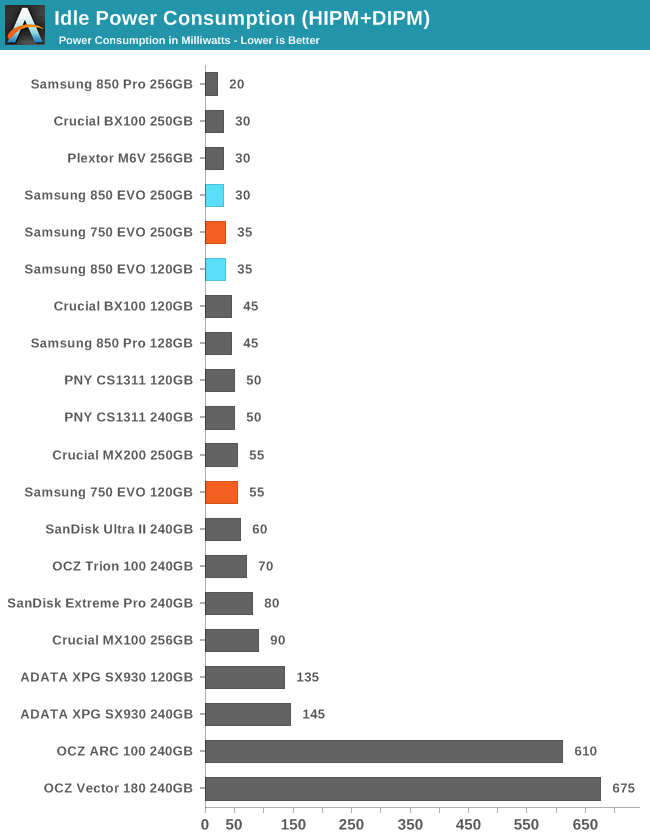
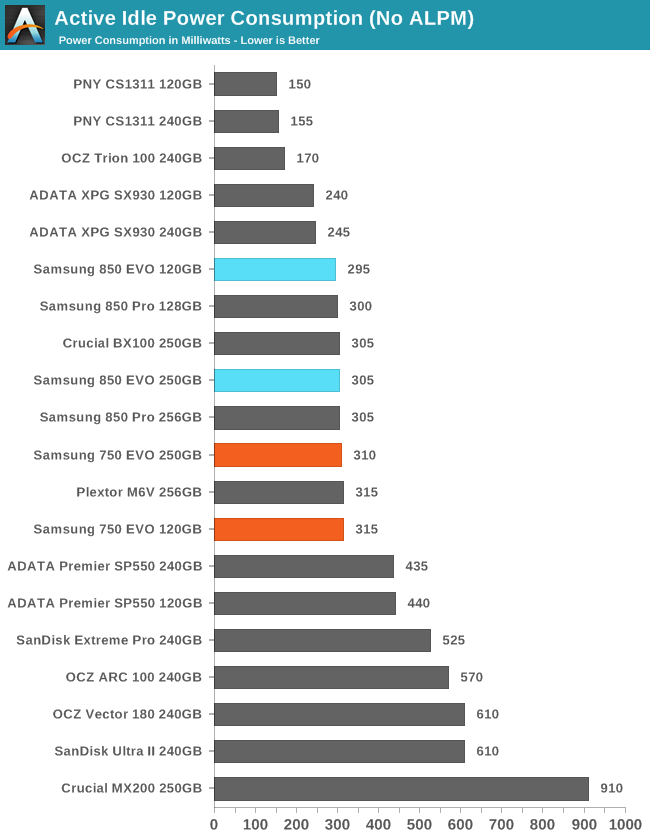
Idle power consumption of the 750 EVO is comparable to other Samsung drives: great when ALPM is enabled, and average when it is disabled.










109 Comments
View All Comments
Shadow7037932 - Friday, April 22, 2016 - link
The prices aren't competitive. The Ultra II in particular tends to go on sale rather often for around $50.Shadow7037932 - Friday, April 22, 2016 - link
Also, if it's anything like the price drop we saw with the 850 EVOs, this could drop down to ~$50 or so in a few months I think.barleyguy - Friday, April 22, 2016 - link
This drive hasn't been out long enough to know what price it will go on sale for. So I consider any comments on pricing pretty irrelevant.Outside of that, there are only 3 brands of SSD I trust my data to, which is Intel, Crucial/Micron, and Samsung. I'll pay more for those 3 brands than I will other brands, because of reliability.
AkulaClass - Friday, April 22, 2016 - link
As 250GB low cost I would grab a SanDisk Ultra II.barleyguy - Friday, April 22, 2016 - link
8 of the 48 reviews of that drive on NewEgg are "worked great until it died in a month and I lost my data". As I said in another post, Intel, Crucial, and Samsung are IMO on a different tier of reliability than everybody else.Shadow7037932 - Saturday, April 23, 2016 - link
I like how you're saying Samsung there without considering the issues they've had with the 840. Out of all three you mentioned, only Intel has had solid SSDs since the first gen.barleyguy - Saturday, April 23, 2016 - link
I actually own an 840 Evo in my daughter's laptop. The issues with it never involved data loss or "early death", only degraded performance. Even in its degraded performance mode it still feels faster than a hard drive. And the patches they issued to "fix" it work pretty well to restore it back to SSD-like performance.So, in short, I still trust Samsung on the SSD front way more than Sandisk.
Though I don't disagree that Intel makes excellent SSDs. They're the way to go for a "critical main desktop" type application.
andrewaggb - Sunday, April 24, 2016 - link
I was going to say that as well. I have an 840 evo in my machine and I haven't lost any data. I regret purchasing it... but it works. The only SSD I've had die so far was a Kingston V100. Still have a couple intel 320 series ssd's running strong, a couple sandisk ones (don't recall the model numbers) that are working and a crucial M500 that is working.Dwedit - Sunday, April 24, 2016 - link
I had the old Intel X25-M, and it had a catastrophic failure where the disk name changed to "BAD CONTEXT" and size changed to 8MB.K_Space - Wednesday, April 27, 2016 - link
X25-M (version 2) still going strong here just not as a main drive since 80Gb is puny. I have both SD Ultra II (960Gb) and 2x Extreme Pro (480Gb) going with no problems. The Extreme Pro was purchased straight after Anadtech glowing review particularly with its 10 years warranty. Not sure what the warranty is for the Ultra II but wouldn't be surprised if its 5+. For every review that says: my SSD died, you'll get a "my SSD is alive & well" so take em with a pinch of salt. It all depends on usage scenario and user expertise and we know how variable that can be.